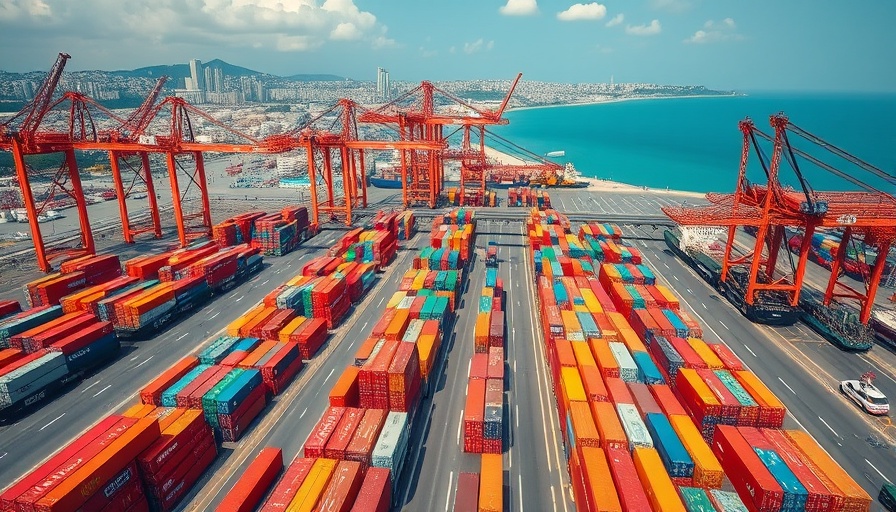
China Responds Forcefully: Tracking the Escalation
In a dramatic turn of events, China has taken decisive action against President Trump's tariffs by enacting an equal retaliation—a sweeping 34 percent tariff on U.S. imports. This move signifies more than mere numerical parity; it underscores the intensifying trade war, marking a pivotal moment in U.S.-China relations. By matching tariffs dollar for dollar, China aims to demonstrate that it will not back down in the face of American pressure.
The Broader Implications of the Tariff Wars
The 34 percent tariff represents a substantial economic challenge for numerous American industries, ranging from agriculture to technology. As both nations gear up for what could be a drawn-out conflict, experts warn that such policies are likely to slow global trade, disrupt supply chains, and ultimately inflate consumer prices.
Critically, China's additional measures—including a blacklist of certain American companies and actions against prominent U.S. agricultural exports—potentially signal a shift towards a more protectionist stance. Agricultural sectors that rely heavily on Chinese markets stand to suffer significant losses as chicken imports cease and tariffs hit staple crops like sorghum. This protectionist trend may exacerbate existing tensions and lead to a cycle of retaliatory actions.
Strategic Moves in a Global Context
China's strategy appears calculated, not only aiming to defend its economic interests but also to reinforce its stance in global trade. By restricting the export of rare earth elements vital for modern technology, China demonstrates leverage as a leading source of these critical materials. As the U.S. pivots towards sourced domestic manufacturing, dependency on these resources cannot be overlooked. Such a tactical pivot plays a fundamental role in the broader geopolitical landscape, positioning China as a formidable player in the global supply chain.
Economic Repercussions That Could Reshape Industries
The ramifications of the current trade war extend far beyond immediate tariff impacts. Industries across the spectrum, especially technology and agriculture, face uncertain futures. Entrepreneurs and businesses may need to rethink sourcing strategies, customer bases, and market positioning as they navigate these challenges.
Furthermore, with growing uncertainties regarding international trade agreements, companies may need to invest in diversification to mitigate risks. Adopted measures may also render the American market less appealing to foreign investor confidence, ultimately impacting job creation and economic growth.
The Domestic Response to International Trade Tensions
Public sentiment may hinge on the administration's handling of trade issues as consumers feel the pinch at the checkout counter. An increase in prices on imported goods will likely prompt consumer backlash, creating pressure on local representatives to advocate for resolution and trade negotiations.
In the wake of these tariffs, public opinion will be pivotal; businesses, policymakers, and consumers alike will have a stake in the outcomes. A collaborative approach may be essential for creating long-term solutions that foster healthy competition and sustainable economic growth.
Future Predictions: Escalation or Resolution?
The trajectory of the U.S.-China trade dispute remains uncertain. Analysts suggest that if both countries continue on their current path, prolonged tensions could inhibit economic growth globally. History has shown that trade wars often hurt the consumer in the end and produce little lasting gain. The hope lies in diplomatic channels to alleviate tensions before they exacerbate.
As both nations engage in this game of economic chess, watching their next moves will be essential for understanding the global economic landscape.
Conclusion: A Call for Strategic Diplomacy
In summary, the ongoing trade war and retaliatory measures taken by China illustrate not just a clash of economic interests, but a deeper geopolitical contest with far-reaching consequences. Stakeholders must advocate for diplomatic resolutions to avert crises that could shake the foundations of international commerce. The ongoing situation demands vigilant attention as the implications of this trade war could reshape not just economies, but entire industries in the years to come. Understanding these developments will empower consumers and businesses alike to engage in smarter economic decisions.
 Add Row
Add Row 
 Add
Add 


 Add Row
Add Row 
 Add
Add
Write A Comment